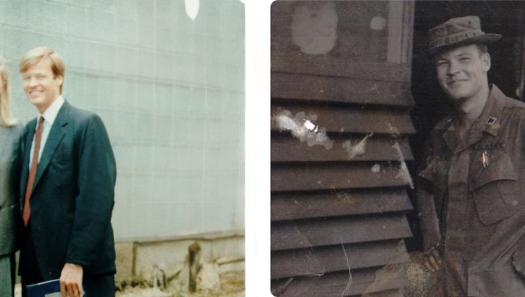Military & Veterans News
Vet News: Rumsfeld, Myers Thank Employers of Guard and Reserve Members
Linda D. Kozaryn, American Forces Press Service
WASHINGTON, July 18, 2003 Defense Secretary Donald H. Rumsfeld and Air Force Gen. Richard B. Myers, chairman of the Joint Chiefs of Staff, thanked about 20 of the nation’s top business leaders today for their support of employees serving in the National Guard and reserves.
Defense officials say employers have become inextricably linked to national security. From 1986 until 2002, the military’s use of the nation’s 1.4 million Guard and Reserve increased from 800,000 man-days annually to 46.8 million.
Rumsfeld expressed the Defense Department’s appreciation for the employers’ support, noting that the reserve components are a vital part of the military’s total force. He said the reserve component personnel that "were activated and did serve in conflicts over the last couple of years have done just a wonderful, wonderful job."
The secretary told the group the military is working on ways to prevent repeat call-ups of reservists with certain skill sets available only in the reserves. Such repeat activations, he said, make it very difficult for service members’ employers and families.
Defense officials plan to prevent repeat activations by taking some of those reserve skill sets and bringing them into the active component. "We’ll do that," he said, "and that will have a good effect of not requiring that we call the same people up four, five, six times in a decade."
"The second thing we’re trying to do a better job of," Rumsfeld said, "is to increase the notification time." In some cases, the Army gave only four or five days’ notice. "We’ve got to do a better job than that."
Myers thanked the employers for what they do each day to support the members of their organizations who are part of the military’s total force. He told the group he’s very optimistic that the United States and its coalition partners will win the war on terrorism, but "it’s going to be an extremely long effort."
Much has been done to counter terrorism, he noted, including standing up the new Homeland Security Department and new commands. "We’re working this problem day and night, as hard as we can," he said.
Terrorism threatens "all instruments of national power," including leaders of industry and the economy, Myers said.
"We are all connected since Sept. 11, 2001, in ways that we probably knew but never articulated or thought much about. When you have bombings in Riyadh, or in Morocco, or in Bali, or anywhere on this globe, we all feel it one way or another. Some feel it very directly, (for) some it’s indirect. But there are consequences of that globally, since we are so connected. Eventually, it gets down to economics and to bottom lines."
Business leaders and the military are bound together in the fight against terrorism in a way that wasn’t quite as obvious before the terrorist attacks of Sept. 11, Myers said. "We’re all in it together."
Employers of reserve component personnel have an even stronger tie to the war on terrorism, he noted. Right after Sept. 11 the military started activating many reserve component personnel. The number peaked at about 80,000 before dropping to between 40,000 to 50,000.
The military activated about 200,000 reserve component personnel for Operation Iraqi Freedom, which Myer said may drop to about 150,000 in four or five months.
"What ‘steady state’ is going to be, I don’t know," the chairman admitted. "I hope it’s not that high a number. But, we’re going to be in Iraq for some time and the reserve component is going to be a piece of that."
Defense officials hope to put "some predictability" into reserve components’ schedules, Myers said.
"Everybody can live with predictable schedules and you can develop your work around them," he said. "What we don’t do so well is providing that predictability. That’s our responsibility and we need to do a better job of that."
Thomas F. Hall, assistant defense secretary for reserve affairs, told the employers that the administration and the department are committed to never having "one more or one less Guardsman or reservist on active duty at one time than we need." Another goal, he said, "is to get them home, get them back to their employers and their families, as soon as their mission’s complete."
Hall applauded the way many employers are taking care of Guard and reserve families. "The stories I’ve heard about what you are doing -- the pay differential, the health benefits, the Hall of Stars I saw at Home Depot are just above and beyond," he said.
SOURCE: Military News Feed


